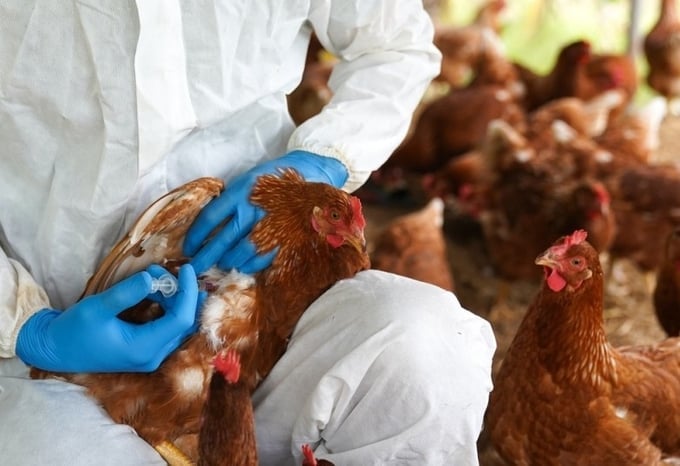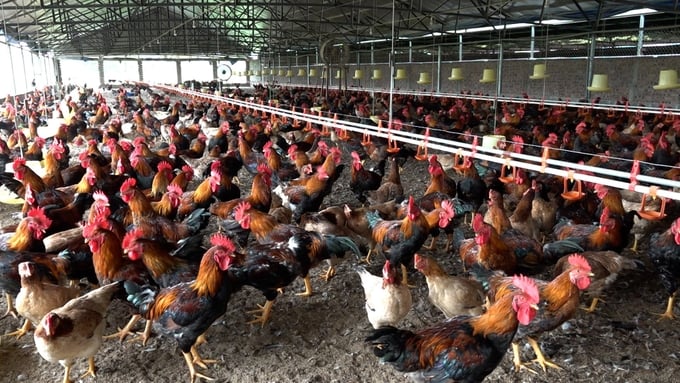November 28, 2025 | 03:46 GMT +7
November 28, 2025 | 03:46 GMT +7
Hotline: 0913.378.918
November 28, 2025 | 03:46 GMT +7
Hotline: 0913.378.918
On April 9, the Ministry of Agriculture and Rural Development issued Document No. 2560/BNN-TY, addressed to the province- and city-level People's Committees, regarding the centralized organization of vaccination against animal diseases for livestock.
The document indicated that, according to reports from the veterinary management authority, Vietnam experienced six outbreaks of avian influenza A/H5N1 in six provinces and cities within the first three months of 2024. As a result, nearly 9,000 poultry were culled. Additionally, one case of fatal avian influenza A/H5N1 virus infection in human was confirmed, and one case of avian influenza A/H9 virus infection in human is currently undergoing treatment.

Local governments are slow to approve and allocate funds for disease prevention and control, as well as allocate funds for vaccine procurement and vaccination programs. Photo: HT.
As of April 9, Vietnam recorded 159 outbreaks of African Swine Fever across 30 provinces. As a result, nearly 5,000 pigs were culled, marking an increase of over 60% compared to the same period in 2023.
Furthermore, 26 outbreaks of Foot and Mouth Disease were recorded across 9 provinces, reflecting a 31% increase; 43 outbreaks of Lumpy Skin Disease were recorded across 5 provinces; and 101 cases of rabies in animals were recorded across 25 provinces.
Active surveillance results revealed that the widespread circulation of the aforementioned pathogens are rapidly occuring at a high rate.
The high risk of dangerous diseases spreading among livestock and potentially transmitting to humans can result in considerable economic losses, restricted livestock development, and adverse effects on public health and the environment.
Real-time inspections conducted across various regions indicate alarmingly low vaccination rates, with many areas falling below 10%. Namely, a sizeable number of domestic animals, poultry, and livestock have either survived their immunity period or have not received any vaccinations.
Local governments have been slow to approve and allocate funds for disease prevention and control, as well as allocate funds for vaccine procurement and vaccination programs.
Additionally, a small number of local governments face difficulties in tendering vaccine procurement, or in coordinating approval of vaccination plans between district and provincial levels. Consequently, these inconsistent vaccination plans failed to meet disease prevention requirements.
The Ministry of Agriculture and Rural Development has issued numerous instructions regarding disease prevention and vaccination activities, with a focus on the use of vaccines against avian influenza, rabies, African Swine Fever, Foot and Mouth Disease, and Lumpy Skin Disease. However, the implementation of these instructions at the local level, especially at the district and commune levels, has been ineffective, resulting in the widespread outbreak of diseases.
In order to prevent the outbreak of dangerous diseases and their transmission to humans, the Ministry of Agriculture and Rural Development urged the Chairpersons of province- and city-level People's Committees to focus on directing their respective Departments, sectors, and local governments in implementing disease prevention measures in accordance with Law on Veterinary Medicine; implementing legal documents under the Law on Veterinary Medicine; implementing national programs and plans approved by the Prime Minister, as well as directives and instructions issued by the Prime Minister. Key focus areas include:
Urgently approving and allocating resources and funds for timely and effective implementation of: National Avian Influenza Prevention and Control Plan from 2019 to 2025; National African Swine Fever Prevention and Control Plan from 2020 to 2025; National Foot and Mouth Disease Prevention and Control Plan from 2021 to 2025; National Lumpy Skin Disease Prevention and Control Plan from 2021 to 2025; National Rabies Prevention and Control Plan from 2022 to 2030.
Compiling accurate statistics on the total livestock population and the number of animals eligible for vaccination against each disease in their respective areas; disseminating information regarding the dangerous nature of the diseases, the benefits of vaccinating livestock, and regulations on penalties for violations.

The Ministry of Agriculture and Rural Development requested local governments to accurately compile statistics on the total livestock population, as well as the number of animals eligible for vaccination against each disease in their respective areas. Photo: Hong Tham.
Urgently implementing the first phase of the mass vaccination campaign in 2024, which will take place from April to May 2024. Notably, the campaign will focus on vaccination against avian influenza (including the use of A/H5 and A/H9 avian influenza vaccines to reduce the risk of A/H9 avian influenza infection, thereby decreasing egg production and minimizing the risk of transmission to humans), rabies, anthrax, African swine fever, foot-and-mouth disease, lumpy skin disease, among others; reviewing previous vaccination campaings, administering additional vaccinations, and ensuring that at least 80% of the livestock population is adequately vaccinated with the correct type of vaccine.
Organizing vaccination against African swine fever in compliance with the Ministry of Agriculture and Rural Development's Document No. 4870/BNN-TY dated July 24, 2023, regarding the use of African swine fever vaccine.
Providing comprehensive, timely, and accurate reports on the state of disease outbreaks and vaccination results through the online Vietnam Animal Health Information Management System (VAHIS).
Directing local Departments of Agriculture and Rural Development and People's Committees to establish inspection teams. These teams will be responsible for overseeing and supervising local animal disease prevention and control efforts, as well as the progress of local vaccination campaigns.
Translated by Nguyen Hai Long

(VAN) On November 27, in the meeting with Minister Tran Duc Thang, Mayor Yin Yong shared Beijing’s experience to improve environment and air quality.

(VAN) After 30 years, both sides identified strategic areas of cooperation: sustainable production, increasing coffee value and training for farmers.
/2025/11/27/4910-4-164708_294.jpg)
(VAN) On the afternoon of November 27 in Beijing, Minister of Agriculture and Environment Tran Duc Thang held a working session with several major Chinese enterprises operating in the agriculture and environment sector.

(VAN) The Department of Animal Health issued a provisional guideline requesting local authorities to increase surveillance, collect samples for testing, and conduct epidemiological investigations according to the established procedure.

(VAN) The United Nations recommends that Vietnam utilize data and artificial intelligence to enhance early disaster warnings and reduce GDP losses by 3.2% in the context of climate change.

(VAN) On the morning of November 27 in Beijing, Minister Tran Duc Thang and the Deputy Commissioner General of the General Administration of Customs of China signed a protocol on fresh jackfruit exports.

(VAN) As floodwaters recede, a vast network of irrigation works across eastern Gia Lai is emerging in a state of severe disrepair, with extensive damage demanding urgent restoration ahead of the 2025-2026 winter-spring cropping season.